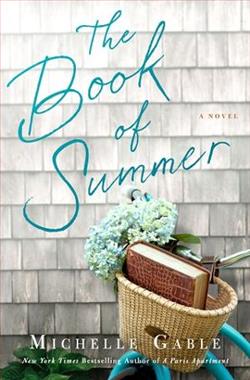
The Book of Summer
by Michelle Gable
Physician Bess Codman has returned to her family’s Nantucket compound, Cliff House, for the first time in four years. Her great-grandparents built Cliff House almost a century before, but due to erosion, the once-grand home will soon fall into the sea. Though she s purposefully avoided the island, Bess must now pack up the house and deal with her mother, a notorious town rabble-rouser, who refuses to leave.
The Book of Summer unravels the power and secrets of Cliff House as told through the voices of Ruby Packard, a bright-eyed and idealistic newlywed on the eve of WWII, the home’s definitive guestbook, and Bess herself. Bess’s grandmother always said it was a house of women, and by the very last day of the very last summer at Cliff House, Bess will understand the truth of her grandmother s words in ways she never contemplated.
.
Read
The Book of Summer on http://kissnovel.net
Martial Peak Reviews
Michelle Gable's The Book of Summer is a poignant exploration of family, legacy, and the inexorable passage of time, set against the backdrop of a Nantucket home teetering on the brink of destruction. The novel deftly intertwines the past and present, revealing the intricate tapestry of lives that have intersected within the walls of Cliff House. Through the voices of Bess Codman, her mother Cissy, and her great-grandmother Ruby Packard, Gable crafts a narrative that is both intimate and expansive, capturing the essence of what it means to belong to a place and a family.
At the heart of the novel is Bess Codman, a physician who returns to her ancestral home after a four-year absence. Her return is not just a physical journey but an emotional one, as she confronts the memories and unresolved tensions that have kept her away. Bess is a well-drawn character, embodying the modern woman's struggle to balance personal ambition with familial duty. Her relationship with her mother, Cissy, is fraught with complexity, as they grapple with differing views on how to handle the impending loss of Cliff House. Cissy, a vibrant and stubborn character, is determined to fight against the erosion threatening their home, symbolizing a resistance to change and a fierce attachment to the past.
The narrative is enriched by the inclusion of Ruby Packard's story, set during the eve of World War II. Ruby's perspective provides a historical depth to the novel, illustrating how the past continues to echo in the present. Her idealism and the challenges she faces as a newlywed during a tumultuous time offer a poignant contrast to Bess's contemporary struggles. Through Ruby, Gable explores themes of love, sacrifice, and the enduring strength of women, reinforcing the idea that Cliff House is indeed a "house of women."
One of the novel's most compelling elements is the use of the guestbook as a narrative device. This clever technique allows Gable to weave together the stories of various characters who have passed through Cliff House, creating a rich tapestry of voices and experiences. The guestbook serves as a metaphor for memory and legacy, capturing the fleeting moments that define a life and a home. It is through these entries that the reader gains insight into the broader history of Cliff House and the community it has been a part of for nearly a century.
Themes of loss and resilience are central to the novel, as the characters grapple with the impending destruction of their beloved home. Gable skillfully portrays the emotional weight of losing a place that holds so much history and meaning. The erosion of Cliff House serves as a powerful symbol of the impermanence of life and the inevitability of change. Yet, amidst this sense of loss, there is also a profound resilience, as the characters find strength in their connections to each other and their shared history.
Gable's writing is evocative and richly descriptive, bringing the setting of Nantucket to life with vivid detail. The island itself becomes a character in the story, its natural beauty and relentless forces shaping the lives of those who inhabit it. The author's ability to capture the essence of place adds depth and authenticity to the narrative, immersing the reader in the world of Cliff House and its inhabitants.
In comparison to other novels that explore similar themes, such as Kate Morton's The Lake House or Sarah Blake's The Guest Book, The Book of Summer stands out for its focus on the female experience and the intergenerational bonds that define a family. Gable's emphasis on the strength and resilience of women is a refreshing and empowering aspect of the novel, offering a nuanced portrayal of the challenges and triumphs faced by women across different eras.
Overall, The Book of Summer is a beautifully crafted novel that resonates with emotional depth and historical richness. Michelle Gable has created a compelling narrative that speaks to the enduring power of family, memory, and place. The novel's exploration of the past and present, and the connections that bind them, offers a poignant reminder of the legacies we inherit and the ones we leave behind. For readers who appreciate stories that delve into the complexities of family dynamics and the passage of time, The Book of Summer is a must-read.
























Reviews 0
Post a Reviews: